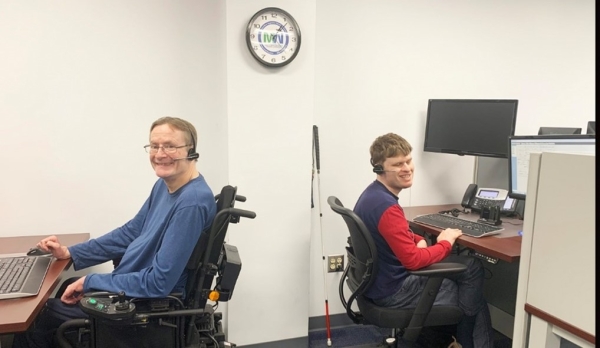October is Disability Employment Awareness Month
“Advancing Access and Equity” is the theme of National Disability Employment Awareness Month (NDEAM). This awareness month is observed every October to recognize and celebrate the important contributions of individuals with disabilities in the workplace and economy. NDEAM also showcases inclusive employment practices and policies to help both employers and employees.
Challenges & Opportunities
Nearly 25 million people have a travel-limiting disability, and 3.6 million Americans (about 1%) with travel-limiting disabilities do not leave their homes because of their disability and are less likely to have a job, according to the Bureau of Transportation Statistics. According to the Bureau of Labor Statistics (BLS), people with disabilities account for only 4% of employed Americans in 2022. They were most likely to be employed in management occupations (12%) and office and administrative support occupations (11%).
As transportation professionals, you know that your services are essential for people with disabilities to access critical services and employment. We also know that the transportation industry is experiencing significant workforce shortages. There is an opportunity for mutual needs to be met – to be employed, and to find employees.
An example of a program specifically recruiting people with disabilities is highlighted in the NADTC blog, Driver Recruitment and Retention Strategies with guest bloggers from the Transit Workforce Centers. They spotlight driver recruitment and retention strategies for workers with disabilities and provide an example from MetroWest Regional Transit Authority (MWRTA) in Framingham, MA that has been working with partner organizations to employ individuals with disabilities.

Credit: Courtesy of MetroWest Regional Transit Authority
Hiring People with Disabilities
Easterseals National highlights five powerful reasons to hire people with disabilities on their All in for Disability Equity website.
People with disabilities are:
- Innovative thinkers and problem solvers. They have had to adapt to new and difficult situations throughout their lives. They can provide insights on your system and solutions that can improve transit for all.
- Reliable employees who have less missed days of work, are highly punctual and stay with a job longer.
- Loyal and have a strong work ethic. Research shows people with disabilities are motivated, which improves staff morale, teamwork and quality of work.
Hiring people with disabilities can help:
- Increase profits. Diversity in the workforce has positive impacts on bottom line and customer loyalty. Having someone on your staff with lived experience in getting around without a vehicle can prove valuable for your program.
- Customers value your values. Customers respond favorably to companies with diverse, equitable and inclusive workforces.
Take Action
Take the opportunity during National Disability Employment Awareness Month to examine your workforce policies and procedures. How many people with disabilities are in your workforce? Are they in decision-making and leadership positions? Have you reviewed your recruitment process? Are you examining your job descriptions? Is it necessary for a dispatcher to be able to lift a case of paper? Is it really mandatory for all staff to have a driver’s license to do their job?
Prioritize accessibility in your any Diversity, Equity and Inclusion (DEI) efforts your agency is already taking. Explore intersectionality and how that impacts your employees.
Consider a mentorship program that could help new employees get up to speed on their job.
Make it easy to request reasonable accommodations for the workplace, job tasks, or policies that can allow someone with a disability to do the job. An employer must provide accommodations unless it would create undue hardship or burden on the organization. The Job Accommodation Network (JAN) has many resources to help answer questions about workplace accommodations. They have a report on Accommodation and Compliance that states the typical cost of an accommodation is around $500 to implement with over 50% saying accommodations did not cost anything.
Some employers are unsure about hiring people with disabilities or are concerned about the cost of accommodations. They don’t realize the benefit to their agency from their life experience, particularly if that individual is interacting with other people with disabilities who use your transportation. Their understanding can improve customer interactions and the quality of your service.
Carrie Diamond is the Senior Director of Transportation and Mobility at Easterseals National. She also co-directs the National Aging & Disability Transportation Center, a cooperative agreement in partnership with USAging and the Federal Transit Administration.